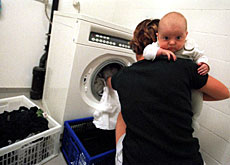
Maternity benefit to become reality from July

Working mothers in Switzerland will be eligible for 14 weeks’ paid maternity leave from July next year.
The announcement comes two months after Swiss voters approved a proposal to introduce statutory nationwide maternity benefits.
On Wednesday the Swiss government announced that the law would come into force on July 1, 2005, ending half a century of uncertainty about the right to paid maternity leave in Switzerland.
Under the legislation, gainfully employed women will receive 80 per cent of the salary they were earning before becoming pregnant, up to a maximum of SFr172 ($149) per day.
Women who give birth during the 14 weeks prior to the introduction of the law will be entitled to claim benefit from July 1 onwards.
This means that the mother of a child born two weeks before the proposal becomes law will only be able to claim 12 weeks’ paid leave.
Clearing up confusion
Although the principle of paid maternity leave has been enshrined in the Swiss constitution since 1945, it has until now been up to individual employers to decide whether to introduce maternity benefits.
Many of the country’s large private companies and employers in the public sector have their own voluntary maternity schemes, but women in unregulated branches of industry have had no entitlements.
Switzerland is the only western European country without statutory maternity benefits.
It is estimated that up to one million women, mostly working in small companies and in poorly regulated industrial sectors, stand to benefit from the scheme.
swissinfo with agencies
Swiss voters agreed to a proposal to introduce statutory paid maternity leave on September 26.
The rightwing Swiss People’s Party argued in vain that the scheme would cost too much.
The Swiss had rejected maternity benefit three times at the ballot box in the past, although the concept was enshrined in the Swiss constitution in 1945.

In compliance with the JTI standards
More: SWI swissinfo.ch certified by the Journalism Trust Initiative

























You can find an overview of ongoing debates with our journalists here . Please join us!
If you want to start a conversation about a topic raised in this article or want to report factual errors, email us at english@swissinfo.ch.